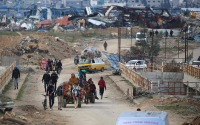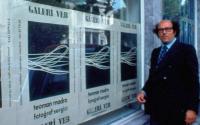November 20, 2003Maureen Dowd
President Bush thought he had at last found someplace even more sequestered from the real world than the Republican fund-raisers and conservative think tanks where he makes his carefully controlled "public" appearances.
Swaddled in the $8.5 million security blanket of reinforced concrete, wire mesh and 14,000 bobbies designed to protect him from the ungrateful citizens of our one — I mean, our closest — ally, Mr. Bush was a blithe spirit in his rented tails with his English cousins behind the high gates of Buckingham Palace.
Even sheltered in the bosom of the British royal family, however, Mr. Bush wasn't entirely safe.
Wearing a blue sash and a tiara with enough diamonds to pay for a year of the Iraqi occupation, the British queen gave the American president a bit of a poke, a light sideswipe with her handbag, as it were.
In her remarks honoring Mr. Bush at the state dinner last night, Queen Elizabeth unleashed a barrage of favorable references to the most dreaded words in the Bush-Cheney lexicon: "multilateral order," "trans-Atlantic partnership," "other allies" and "effective international institutions."
"At the very core of the new international and multilateral order, which emerged after the shared sacrifices of that last terrible world war, was a vital dynamic trans-Atlantic partnership working with other allies to create effective international institutions," she said. This, to a president who has never met an international institution he did not try to wreck and who's darting around like a fugitive in the land of the "special relationship," using Buck House as a safe house.
Her Majesty barely mentioned the pesky colonial mess in Iraq — where U.S. occupiers are also surrounded by razor wire, concrete barricades and armed guards — and spent more time praising the first President Bush's leadership than the second's.
Everything Mr. Bush did in London reinforced the idea that this was a trip made not so much to thank the British people for their friendship, but to send a message to the voters back home that he was at ease as a world leader.
The White House spared Mr. Bush from having to endure a session with the rowdy Parliament and flew him by helicopter over the protesting rabble, who think a bullying Bush administration dragged Britain into the war under false pretenses. (Scotland Yard even wanted to keep the president in a "mobile-free bubble" that would block cellphone calls in his vicinity, but the phone companies refused, calling it "Bush hysteria.")
The White House packaged the visit for the viewers at home.
How else to explain the same Bush advance geniuses who brought us the "Mission Accomplished" banner putting up a blue PowerPoint-ish backdrop for the president's speech at Whitehall Palace that stuttered, "United Kingdom," "United Kingdom," "United Kingdom."
The people in the United Kingdom already knew he was in the United Kingdom. And the kingdom isn't very united at the moment.
Ken Livingstone, the mayor of London, captured the spirit of the moment when he told NPR that the Republican National Committee should foot the bill for Mr. Bush's extraordinary security, the largest police operation ever in Great Britain. All this, he harrumphed, "just so George Bush can use a few clips of him and the queen in his campaign advertisements for re-election next year."
There was a dispiriting contrast between G.W.B. shutting out the world and avoiding the British public, and the black-and-white clips this week of J.F.K. reaching out to the world and being adored by Berliners.
There was also a dispiriting contrast between the Bush administration, hiding the returning coffins of U.S. soldiers and avoiding their funerals, and the moving pictures of the Italian politicians and people, honoring their dead with public ceremonies and a week of mourning.
The bubble in London is just an extension of the bubble the Bush team lives in at home. It superimposes its reality on the evidence for war, the ease of the occupation, the strength of the insurgency and the continuing threat from Saddam and Osama.
Isolationism has been a foreign policy before. But for this administration, it seems to be a way of life.






